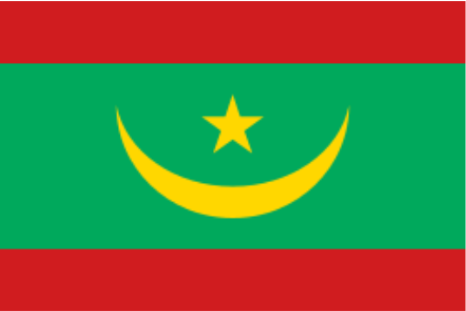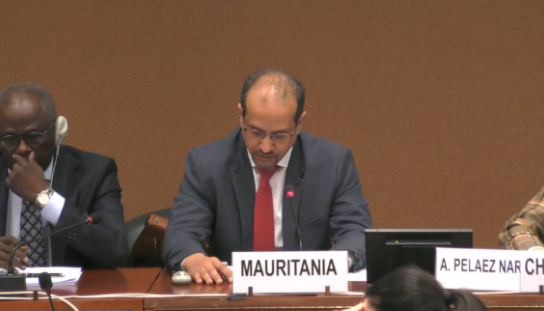84th Session of the Committee on the Elimination of Discrimination against Women (CEDAW)
6th February 2023 – 24th February 2023
Consideration of Mauritania
15th of February 2023

By Bethany Morley / GICJ
Executive Summary
On the 15th of February 2023, The Committee on the Elimination of Discrimination against Women (CEDAW) conducted the fourth periodic review of Mauritania, covering the period from 2014 to 2018, at the 1953rd meeting of the 84th session of the Committee.
The focus of the committee coalesced around the failure to enact laws to protect women such as the draft law on violence against women and girls that is yet to be enacted; high levels of Gender Based Violence (GBV) and Female Genital Mutilation (FGM); broad mandates; patriarchal laws such as those on divorce, child custody, and inheritance which directly discriminate against women; and the legality of the death penalty which can be imposed for a range of offences such as adultery which predominantly effects women as if accused of sexual relations out of wedlock, the authorities likely to not believe the woman due to patriarchal structures.
Geneva International Centre for Justice (GICJ) applauds the work Mauritania has thus far done to advance women’s rights. However, we are deeply concerned about reports of the Mauritanian government failing to fully commit itself to the implementation of the Committee on the Elimination of Discrimination against Women due to high levels of Female Genital Mutilation, Human Traffiking, the Death Penalty and discrimination still being reported. We urge Mauritania to take more effective measures to protect women and girls from all forms of violence and discrimination, particularly regarding female genital mutilation and human trafficking.
Background
The Committee on the Elimination of Discrimination against Women is constituted of 23 experts on women’s rights from around the world, who monitor the global implementation of CEDAW.
The CEDAW treaty is a tool that helps women around the world bring about change in their daily lives. In countries that have ratified the treaty, CEDAW has proved invaluable in opposing the effects of discrimination, including violence, poverty and a lack of legal protection, amongst other things.
As this is the 4th cycle of CEDAW for Mauritania, the country will be following up on the recommendations made in the previous reviews. Mauritania’s first periodic review on the implementation of CEDAW took place in November 2010, with the combined second and third reviews taking place in July 2014 (CEDAW/C/MRT/CO/2-3), respectively.
Statement of Mauritania
The high-level delegation of Mauritania was headed by his excellency commissioner for human rights, humanitarian action and relations with civil society, Mr. Cheikh Ahmedou Ould Ahmed Salem Ould Sidi, introduced the Mauritanian report. Mr. Sidi noted that Mauritania has always understood the importance of upholding human rights and how they affect development. Therefore, the government has always been committed to its international obligations and has always sought to eliminate all forms of discrimination against women.
introduced the Mauritanian report. Mr. Sidi noted that Mauritania has always understood the importance of upholding human rights and how they affect development. Therefore, the government has always been committed to its international obligations and has always sought to eliminate all forms of discrimination against women.
Mr. Sidi emphasised that the legal framework of Mauritania has seen significant progress and improvements in areas such as; the criminalisation of discrimination; women's accessibility to electoral districts, positions and registers 2018; reproductive health; and the prevention and punishment of human trafficking ,with many other laws being in progress now.
Further, it was noted that in order for the country to implement the provisions of CEDAW, a law was introduced in 2014 whereby the convention can now be invoked before local courts and has precedence over local laws in accordance with article 80 of the Mauritania constitution. Additionally, workshops and training sessions are readily available to raise awareness about the convention, and hotlines are open for women who are experiencing violence,
The floor was then given to the president of the National Human Rights Commission of Mauritania, Dr. Ahmed Salim Bouhbini, who noted the actions and commitments of Mauritania in the field of human rights, in particular the activities to tackle human trafficking and migrant smuggling. Dr. Bouhbini welcomed mechanisms Mauritania has thus far put in place, however, he noted that they would gain in standing were they to be made permanent structures through law and not a decree. Further, the sheer number of mechanisms and ways of promoting human rights that Mauritania has presented often acts as a ‘smoke screen’, concealing the need to move to enact them as laws.
Interactive dialogue
The Committee experts commended Mauritania for the work done thus far in advancing women’s rights. Particular attention was paid to the State’s advancement in education for women. However, concerns were raised during the interactive dialogue about the prevalence of FGM and human trafficking as well, as the use of the death penalty.
FGM
There is a lack of statistical data on FGM in the country in urban and rural areas. Committee experts Ms. Genoveva Tisheva and Ms. Nicole Ameline, noted the adoption of legislation against FGM and health professionals who issued opinions in favour of the abolition of FGM. Ms. Tisheva expressed concerns that poverty, marginalisation, and harmful gender stereotypes make women easy targets for violence in rural areas. Whilst Ms. Ameline noted that the practice of FGM is comparable to torture, and though the state has chosen to consolidate the rule of law, it is still incompatible with such practices.
Further, experts asked questions including whether accurate statistical data could be provided, particularly in rural areas. Can the actors involved in the strategy to combat FGM be identified? Have harmful stereotypes been aptly addressed in the country to reduce levels of FGM?
The delegation replied tot his line of questioning by ensuring that significant results in combatting FGM had already been achieved, though it is considered a customary practice. It was noted that the government has already developed a strategy for promoting the end of FGM, which is being implemented. Further, FGM is prohibited under Mauritanian law. Moreover, perpetrators who commit the act of FGM have been convicted for up to 6 years.
Human trafficking
The committee expert raised concerns that substantial results of the protection of women from trafficking had not yet been achieved. Ms. Tisheva acknowledged the state's adoption of a comprehensive NAP allowing for the criminalisation of perpetrators. However, it remains a source, transit and destination country for human trafficking, including forced labour, sex trafficking and widespread modern slavery. The state party is yet to achieve substantial results in combating trafficking.
Experts questioned what measures the country could put in place to tackle trafficking. And can the state identify the major actors involved in identifying cases of trafficking?
The delegation responded to this line of questioning by noting that a national body had been established to eradicate human trafficking and had begun compiling statistics on trafficking and slavery to create a database. Further, there is a mandate to tackle human trafficking where victims have been identified and provided with support. The delegation also noted that awareness campaigns are prominent in the country.
The Death Penalty
Committee Expert and Country Rapporteur for Mauritania, Esther Eghobamien-Mshelia and Chair of the Committee, Ana Pelaz Narvaez, noted that the use of the death penalty is a crime against humanity and questioned whether there were any social or moral sanctions put in place to deter harmful cultural practices, such as the death penalty.
The delegation said that although the death penalty had not been abolished in Mauritania, a temporary prohibition of the death penalty being used was in place. Further, Mauritania is an Islamic country, therefore the justice system is guided by Islamic Sharia. However, the delegation noted that it will endeavour to find a favourable solution that takes into account the recommendations of human rights.
Position of Geneva International Centre for Justice
Geneva International Centre for Justice (GICJ) applauds the work Mauritania has thus far done to advance women’s rights. However, we are deeply concerned about the reports of the country of Mauritania not fully committing itself to the implementation of the Committee on the Elimination of Discrimination against Women. Further, we are concerned with reports of women continuing to face discrimination, with high rates of FGM and human trafficking still occuring.
Additionally, though we acknowledge that the State’s law is directly inspired by Islam and Sharia law, we urge Mauritania to take into account the commitments under the convention as a state party, which bears a responsibility to uphold fundamental human rights. Further, we urge states who have found compatibility between Sharia law and international human rights law to engage with a constructive interpretation of the two to progress in the strengthening of women’s and girls’ rights within this framework.
CEDAW Committee on the Elimination of Discrimination against Women, Mauritania, human_rights Geneva, justice, geneva4justice, GICJ, Geneva International Centre for Justice












